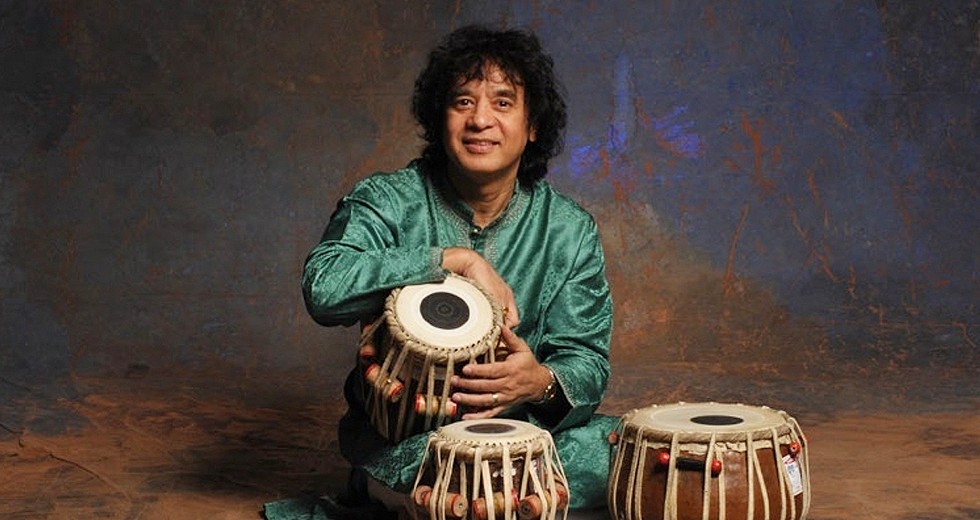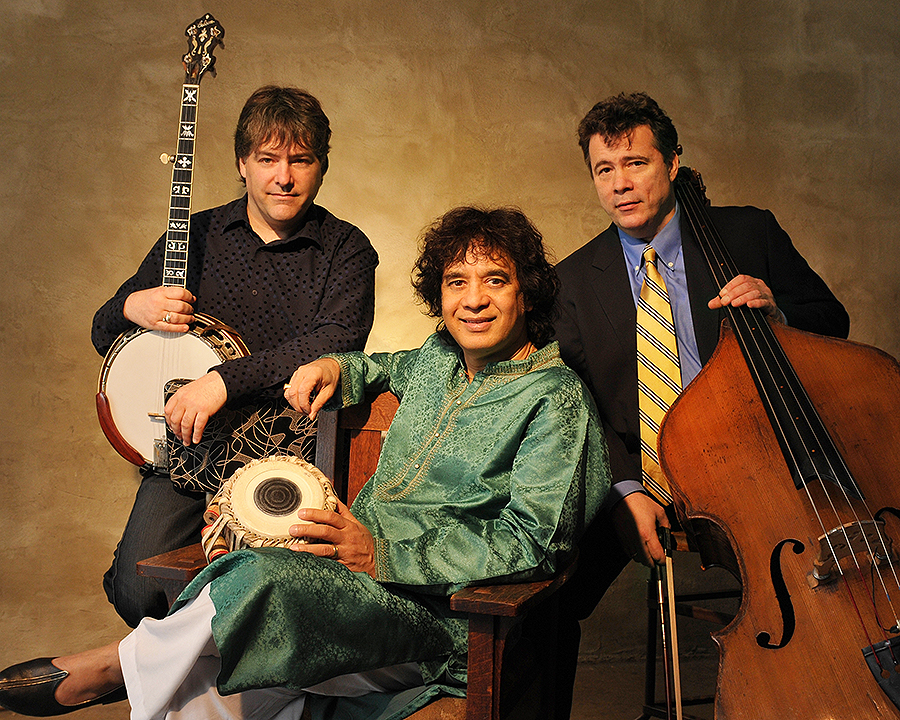
Communicative, limitless, sympathetic, friendly, fun.
Those are the words Zakir Hussain chooses to describe the tabla, the dual-drum instrument that has helped drive the popularity of Eastern music to cultures around the world over the past 300 years.
For Hussain, a lifelong tie to the tabla was inevitable. He tells the story of his father, tabla master Alla Rakha (who with Ravi Shankar introduced India’s ethereal music to America), whispering the rhythms of the tabla into the ears of his newborn son.
Sixty-four years later, Zakir Hussain continues the legacy as he introduces the tabla’s fluttering finger rhythms not only to new generations — including his young granddaughter — far beyond his native Mumbai. He also has introduced the tabla to the receptive ears of bluegrass, jazz and classical music devotees.

With Béla Fleck (left) and Edgar Meyer, Zakir Hussain wrote the Triple Concerto for Banjo, Bass and Tabla. | Photo: Jim McGuire
Hussain will bring his Masters of Percussion program to Orchestra Hall for an SCP Special Concert on March 20, and all of the words the master uses to describe his tabla will come into play. “In Masters of Percussion shows, the idea is to bring to audiences the rhythm traditions that they may not be aware of, and also provide the drum masters access to a respected platform in which they can share their cultures with the audiences,” Hussain explains.
While the tabla is the program’s musical centerpiece, Masters of Percussion is not simply a showcase for Hussain to hand off a few solos to his guest artists. Instead, Hussain leads a collaboration where the star is an accompanist. “Tabla has the ability to harmonically support any instrumentalist or singer,” he says. “The technique taught on tabla allows the instrument to replicate patterns of any music genre under the sun. There’s a comfortable give and take, no matter what the musical combination may be.”
Hussain’s roster of past collaborators nicely sums up his world of musical interests, among them jazz-fusion guitarist John McLaughlin, Grateful Dead drummer Mickey Hart and banjoist Béla Fleck. The Detroit Symphony, under the baton of Leonard Slatkin, performed Triple Concerto for Banjo, Bass and Tabla, a piece co-composed by Hussain, double-bassist Edgar Meyer and Fleck, in 2009; Christoph Eschenbach conducted the National Symphony in Hussain’s Concerto for Four Soloists at the Kennedy Center in 2011.
For this Masters of Percussion program, Hussain is bringing together masters of the tavil (barrel drum) and mridgangam (cylindrical double drum) from the southern Indian tradition, the dholak (cylindrical, barrel double drum) from central India and Pakistan, and taiko and odaiko drums from Japan. A sarangi (stringed instrument played with a bow) from northern India will supply the melodies.
The tabla master will draw from all of his skills as a collaborative artist: “a decent sense of rhythm, the ability to listen and respond simultaneously, being able to fearlessly improvise and a commitment to tradition. It will be my job to curate this conversation on the fly, which will be very exciting,” Hussain promises.
It’s another “leap of faith” in a life’s journey that knows no bounds.
“There is a belief in our music world that every instrument has a spirit, and half the battle on your way to becoming a musician is to be accepted by the spirit,” he says. “That acceptance happened very early in my life. … Tabla has been my best mate ever since I can remember.”
He’s still growing, learning and sharing. “Miles to go before I sleep,” Hussain says. “There are many masters I want to collaborate with and learn from. But most importantly, I am only now beginning to get a deeper insight into the music of masters I have worked with over the past three decades. I feel I can be a better accompanist to them now than I was before.”
Joe Pixler is a Chicago-based arts writer.